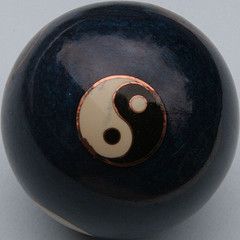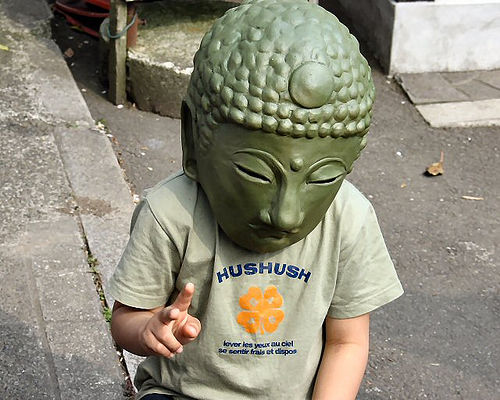
I’ve interrupted my regular posting schedule to bring you this important message.
On Sunday, well-known and well-liked blogger Leo Babauta of ZenHabits received an email from the lawyers of author Susan Jeffers, claiming that he had infringed on her trademark in one of his posts by using the phrase “feel the fear and do it anyway” — the title of Jeffers’ book.
That Leo had never heard of the book is, from a legal standpoint, supposedly not relevant. The fact that he was only repeating an intuitive phrase he’d heard from a friend on Twitter (to whom he did give credit in the post) does not excuse him from his offense. It is his responsibility to be aware that the words he used to convey his point had been rendered off-limits by somebody else’s choosing them for a book title, years earlier. Considering how many books and products are out there, I wonder how many of my posts contain book titles or slogans, and whether I’ve already got threatening letters on the way. Read More

Six years ago, when I lived in a snowy mountain village and paid my bills by cleaning high-end sinks and toilets, someone said something that prompted me to confront an uncomfortable truth about myself.
A well-meaning coworker mentioned that she had been talking to another housekeeper about me. Oh?
“She said, ‘David is a such great guy to work with, it’s just that he’s just so quiet.‘”
I don’t remember how I responded, but I assume I tried to disagree somehow, and went back to my work hoping nobody would ever say that to me again. Read More

I used to roll my eyes when people talked about the Beatles. Maybe you rolled your eyes when you saw this article’s headline. Thank you for bearing with me anyway. I’ll make it worth your while.
I had always pictured the Beatles as a tired novelty from my parents’ past. All I knew was that they played lot of teenagey love songs in their early years, and some weird drug songs in their later years, and that they seemed to have written virtually every famous song that I didn’t want to listen to.
Gradually I came around, and began to recognize that they really were something special. I harbored an understated respect for them for many years, but two summers ago I spent a few incredible weeks devouring all twelve proper Beatles albums, in chronological order. It was magical. I was struck by how beautifully and organically their sound evolved, growing more sophisticated and mature every album.
By the final phrases of of Abbey Road, I had grown too. And not insignificantly. I can’t quite put my finger on exactly what moved me, but it definitely had something to do with the beautiful metamorphosis I witnessed. Read More

David began a 30-day daily meditation experiment on April 6, 2009. The original post is here. David’s progress log is here.
Well it’s been a real trip so far. Here we are at the halfway point.
After a rocky first week, I’ve settled into a comfortable groove. But it took a bit of trailblazing. About a week ago I decided not to follow a prescribed traditional method. I didn’t want to compromise it with my own assumptions. I wasn’t comfortable with written or prerecorded instruction. I felt an intense need for a flesh-and-blood teacher to show me.
And I will find a teacher, either in a meditation class, or on some sort of retreat, but not during this experiment. I decided to take a more free-form approach to my daily sessions, and it’s beginning to pay great dividends. Read More

This is part 2 of a 2-part post. The first half is here.
If there’s no good and evil, why do people steal and hurt others?
Because they’re dumb. They just don’t know any smarter and more rewarding ways to live.
Ok, ‘dumb’ is a little misleading. There are intelligent people who commit crimes and atrocities too. A person can have a genius IQ, yet still misbehave himself into addiction, ruined relationships, or prison. ‘Foolish’ might be a better adjective.
What they lack is wisdom. Insight. They just don’t know how to cultivate peace in their lives. So they grasp at things that provide fleeting scraps of fulfillment: money, power, gratification. They don’t know where else to look. But of course it’s never enough, and so desperation mounts. They begin to feel an even stronger draw towards gratification and security, mistaking them for some kind of salvation, and soon they are stepping over others (or worse) to acquire these things. They just don’t get it.
A common argument is that without morals, we wouldn’t know how to behave. We’d become greedy, cruel and petty, slaves of every selfish impulse we have. Well, I don’t think so. I don’t know about you, but I’m smart enough to see the benefits in being good to others, and the drawbacks of being mean. There are natural incentives built into both love-based and fear-based courses of action. It is clear to me that this is exactly what religions were trying to teach: that there are smart ways to live, and dumb ways to live.
Read More

This is part 1 of a 2-part post. The second half is here.
Disclaimer: Controversy rating: 8/10. This post contains unconventional views. Some readers may be upset. Some may unsubscribe. Que sera sera.
There is a famous quotation that most people seem to love, which I dislike. In fact, I find it quite worrisome, because of how quickly even reasonable people seem to jump behind it.
I am a staunch defender of ideas, and people’s rights to express them, even if I disagree. I don’t think ideas themselves can be harmful; any harm comes only from the actions they inspire. For example, I do not believe in laws against ‘hate’ speech; but I do support laws against deliberately inciting violence. It isn’t the speech that’s dangerous, it’s the actions. As far as I’m concerned, when a hateful person is allowed to speak his mind, he only reveals himself as petty and foolish. I think that’s a good thing. Let idiocy shine a light on itself, that’s what I say. If you tape its mouth shut, we might not recognize it.
But there is one idea, encapsulated in a well-loved quotation, that I think is at the root of every institution of war and genocide. Of course it does not always lead to those dark places, but it contains a fallacy that can delude even a good-hearted person into committing atrocities. And I want to expose its insanity. Read More

Thank you, everyone.
Thank you, raspy-voiced, chainsmoking high school student for showing me where the sheet metal shop was on my first day of junior high shops. I was lost and frightened.
Thank you Mr Isaacs, for pulling me out of class and chewing me out for quitting basketball. It was so thoughtful of you.
Thank you Ms Shawcross, for phoning me years later and telling me you shared my old short story with your new class. I’m glad they liked it.
Thank you Nadia, Lisis, Roger, Michael, Sherri, Gwynn, Ian, Jay and Alison for welcoming me with open arms into the blogging world.
Thank you, kind readers, for finding my words worthwhile. I appreciate it more than you know. Read More

The smallest bookstore still contains more ideas of worth than have been presented in the entire history of television. ~Andrew Ross
I am indeed prone to hyperbole, but I’ll go ahead and say it: the advent of writing is by far the greatest tipping point in all of civilization. Often I think about the instant in which it happened, that very first moment when a primitive person scored a few strokes on a rock face, in order to demonstrate some idea, however simple, to another cave-dweller.
It floors me that there was a specific point in time (maybe at seventeen minutes after sunrise on the 25th day of the year 42,128 B.C.) when a few people convened to attempt to relate something to each other with markings on a wall. They could never have imagined the epic, world-changing sequence of events triggered by this tiny, innocuous act, but I suspect that each of those individuals left that little gathering with an as-yet-unprecedented sense of understanding and closeness to their peers.
That first instance of symbol-scrawling unlocked an incalculably powerful ability in humans. Suddenly, knowledge was no longer confined to an individual’s memory. It could be transferred, replicated, stored and accumulated. It could be displayed in a public area, for an entire community to see and absorb into their own personal knowledge. Each individual could now contribute their own exclusive insights and experiences to a collective, whereby everyone could gain from them.
Whatever happened that day exactly, it marked the point in time when knowledge became bigger than any one person. Finally we could accumulate information and insight outside of our addled, vulnerable brains. Writing made thought permanent, immortal.
Read More

“Hell is other people.”
~Sartre
Whether it’s the rude throng of last-minute Christmas shoppers, or the drunken fratboys slithering up to you at a concert, or the old man in the restaurant booth behind you who clears his decrepit throat every forty seconds, everyone finds themselves feeling a general aversion to people now and then. For those with any level of social anxiety, there is always at least a hum of this derision in the background, sometimes a full-on shout. Even for those without it, repeated ugly experiences can inspire a familiar distaste for people that may never completely disappear. Unless, of course, the people do.
Sometimes the feeling is disdain for their behavior, other times it’s a fear of it. Think of the last time you got upset. Chances are, the actions of another person had something to do with it. Other people seem to trigger the most unpleasant emotions in us. Self-consciousness, intimidation, embarrassment, anger, vulnerability and humiliation tend to characterize our most painful experiences and our most unsettling memories.
When people are present, suddenly there arises a certain tension in the body and mind, however subtle. Our senses are very keen to the spectrum of threats other human beings can present to us. This physical and emotional reaction to people could almost be described as an allergy; an involuntary reaction to the introduction of a certain element to the environment. This offending element is humanity. Read More

Little Buddha says, “Chill out.”
In my About section, I mentioned that experimentation is important to the spirit of Raptitude. From the start, this blog has been about improving humanity through improving yourself, and improving yourself primarily by developing mental skills. Most of the skills I’ve talked about already, namely keeping life fresh, investing your attention on purpose, and enjoying the mundane moments are contingent upon one’s ability to direct their attention to where they want it. I am conducting Raptitude’s first public experiment to help to develop my ability to do that.
I exercise mindfulness in my actions every day, but I’m much less consistent with sitting meditation. These days I never really sit down to actively practice the deliberate rendering of attention, whether it’s onto my breath, my body or some other foci.
If I were to define meditation I would call it “the art of directing one’s attention.” The human mind is so flighty and fickle it’s actually hilarious how difficult it can be to keep it in one place. Civilization does a good job at distracting us 24-7. As I type this I’ve got four Firefox tabs open, TweetDeck keeps popping up, and I’ve already answered two phonecalls. Shutting them all out seems like the most obvious response, and I will do some of that (ok TweetDeck is closed.) But I am more interested in improving the other end of the equation: me. Read More










 I'm David, and Raptitude is a blog about getting better at being human -- things we can do to improve our lives today.
I'm David, and Raptitude is a blog about getting better at being human -- things we can do to improve our lives today.
It all pretty the opposite if you're not in the US :) Since 2022 I've changed 3 countries and I'm planning to emigrate to the fourth one. I've had so much novelty and so many things to adapt to. However, time had never run so fast for me as in 2022...